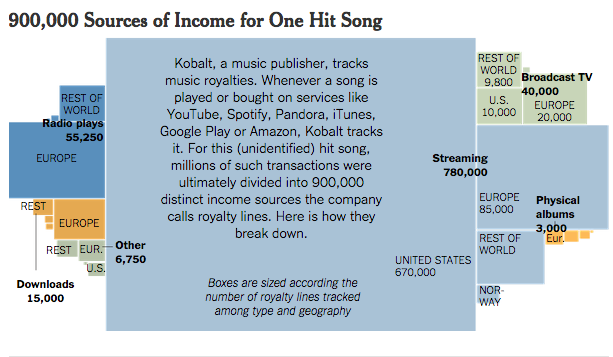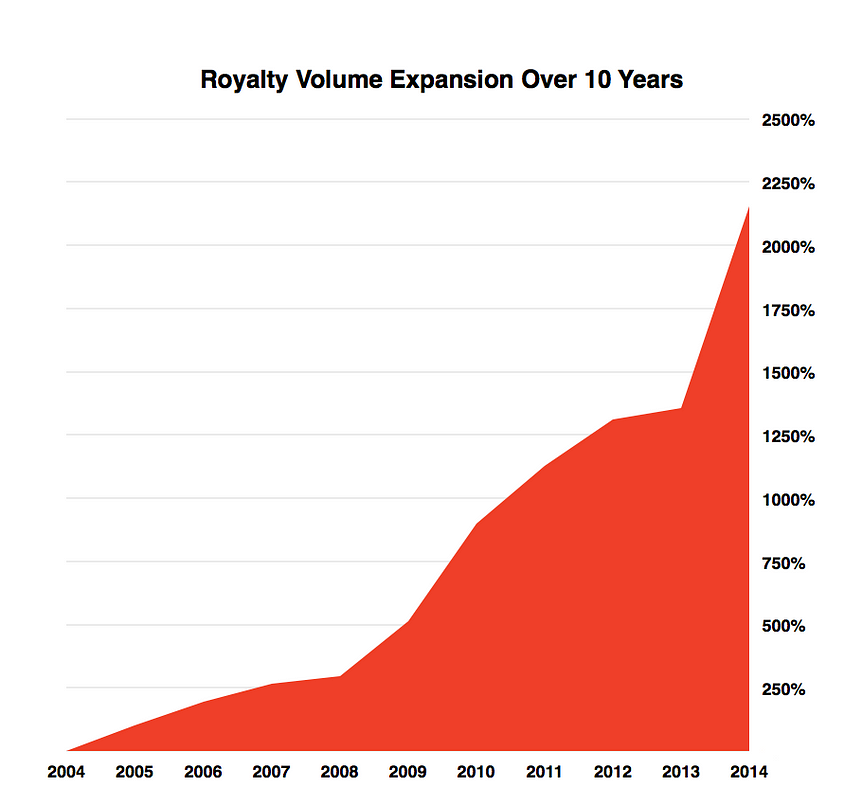
01 Jul Kobalt Pub CEO Says There Are 900,000 Distinct Royalty Payments For Songwriters
Here’s an excerpt from Kobalt Music CEO, Williard Ahdritz, and originally appeared on Medium.
One hit song today can generate up to 900,000 distinct royalty payments, and just one of those could be from Spotify in the U.S., for billions of individual streams, that then have to be accounted for and paid out to each of the song’s different writers.
Over 75% of those 900,000 royalty lines come from streaming services (i.e. YouTube, Spotify, Pandora, Tidal, Rdio, etc.), each delivering data in different ways, for different time periods, using different calculations, across different geographies. Since 2004, this volume of royalty lines has grown by almost 2,500%. And with the announcement of Apple Music last week, plus Spotify’s bullish determination to grow, and the number of new services jumping into the game, the volumes of data to come from streaming will be staggering. Streaming will impact the music industry more than any format we’ve ever known.
It’s no surprise then that the music industry’s outdated back-end accounting systems are not capable of processing all of this complex data in an efficient or timely way.
Simply put, the back-end pipes of the music industry are broken — something the general public doesn’t realize, until a major talent pulls their catalogue from a streaming service in protest.Consumers love their instant access to music today, but few know that it takes up to 2–3 years for songwriters to get paid for their work, losing as much as 60–70 percent of their money in transactional costs along the way. And then when you factor in the opaque royalty statements that songwriters get, it’s clear that the creators are the biggest losers in today’s music ecosystem.
Remember, this is a songwriters’ salary we are talking about. And not just the superstars, but thousands of writers you’ve never heard of creating your favorite songs. Just imagine if you didn’t know when or how much you were getting paid or how much the middlemen were taking out of yourpaycheck.When I speak with young music students and aspiring songwriters, I sense their fear and uncertainty about the future of their careers. And it’s not the fault of the streaming services; the fault lies with the music industry’s general lack of investment in technology, its inefficient, outdated collections structure, and a broad disregard for trust and transparency.
Fortunately, there’s hope. In addition to the work we’re doing at Kobalt, there are several technology-focused companies working to better serve music creators. Apple’s acquisition of MusicMetric and Spotify’s purchase of Echo Nest are both signs of the companies’ support for cleaner and deeper data delivery to licensors and artists. PledgeMusic delivers a great deal of value to artists seeking up-front investment from supporters, as well as delivering crucial data around fan engagement. Next Big Sound (recently acquired by Pandora) is capturing an impressive array of information about new music uses and the relationships between artist and audience, as well as between bands and brands.
And now, the media are taking notice too. I’ve seen more news coverage on songwriters getting paid in the past six months than I’ve seen in the past ten years. People are finally talking about this critical issue, which is an important step in resolving it once and for all.
All of this is music to my ears, signaling a shift toward an industry that embraces a higher standard of respect for the rights of artists and songwriters, as well as a real commitment to technology as an opportunity, rather than an obligation.
Please like and connect with me on Facebook!


